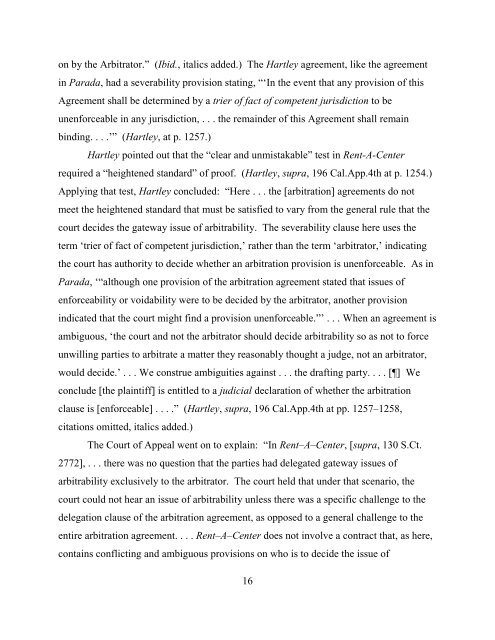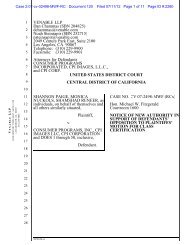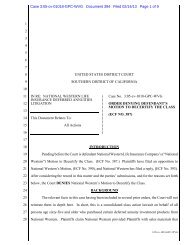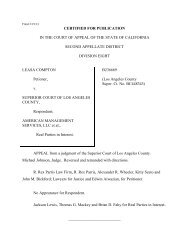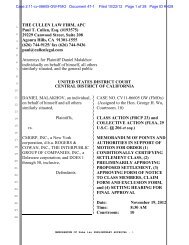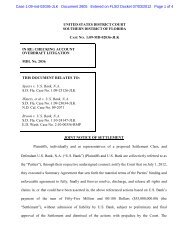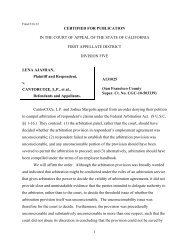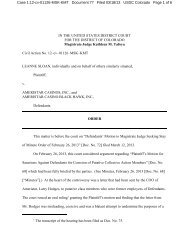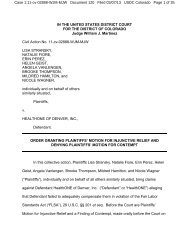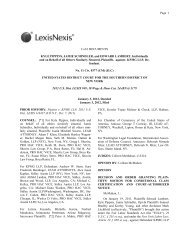here - FindLaw
here - FindLaw
here - FindLaw
You also want an ePaper? Increase the reach of your titles
YUMPU automatically turns print PDFs into web optimized ePapers that Google loves.
on by the Arbitrator.‖ (Ibid., italics added.) The Hartley agreement, like the agreement<br />
in Parada, had a severability provision stating, ―‗In the event that any provision of this<br />
Agreement shall be determined by a trier of fact of competent jurisdiction to be<br />
unenforceable in any jurisdiction, . . . the remainder of this Agreement shall remain<br />
binding. . . .‘‖ (Hartley, at p. 1257.)<br />
Hartley pointed out that the ―clear and unmistakable‖ test in Rent-A-Center<br />
required a ―heightened standard‖ of proof. (Hartley, supra, 196 Cal.App.4th at p. 1254.)<br />
Applying that test, Hartley concluded: ―Here . . . the [arbitration] agreements do not<br />
meet the heightened standard that must be satisfied to vary from the general rule that the<br />
court decides the gateway issue of arbitrability. The severability clause <strong>here</strong> uses the<br />
term ‗trier of fact of competent jurisdiction,‘ rather than the term ‗arbitrator,‘ indicating<br />
the court has authority to decide whether an arbitration provision is unenforceable. As in<br />
Parada, ‗―although one provision of the arbitration agreement stated that issues of<br />
enforceability or voidability were to be decided by the arbitrator, another provision<br />
indicated that the court might find a provision unenforceable.‖‘ . . . When an agreement is<br />
ambiguous, ‗the court and not the arbitrator should decide arbitrability so as not to force<br />
unwilling parties to arbitrate a matter they reasonably thought a judge, not an arbitrator,<br />
would decide.‘ . . . We construe ambiguities against . . . the drafting party. . . . [] We<br />
conclude [the plaintiff] is entitled to a judicial declaration of whether the arbitration<br />
clause is [enforceable] . . . .‖ (Hartley, supra, 196 Cal.App.4th at pp. 1257–1258,<br />
citations omitted, italics added.)<br />
The Court of Appeal went on to explain: ―In Rent–A–Center, [supra, 130 S.Ct.<br />
2772], . . . t<strong>here</strong> was no question that the parties had delegated gateway issues of<br />
arbitrability exclusively to the arbitrator. The court held that under that scenario, the<br />
court could not hear an issue of arbitrability unless t<strong>here</strong> was a specific challenge to the<br />
delegation clause of the arbitration agreement, as opposed to a general challenge to the<br />
entire arbitration agreement. . . . Rent–A–Center does not involve a contract that, as <strong>here</strong>,<br />
contains conflicting and ambiguous provisions on who is to decide the issue of<br />
16


